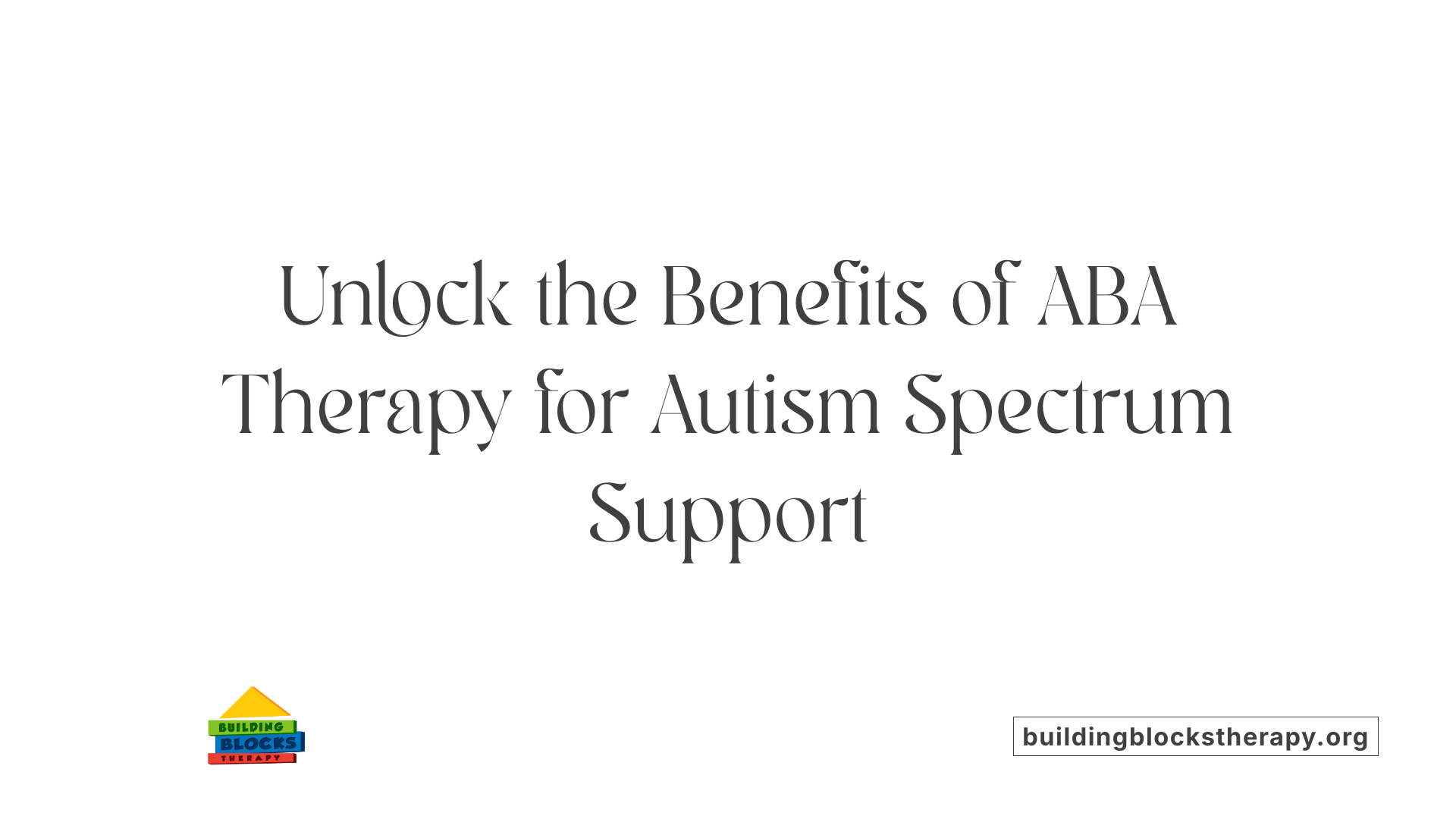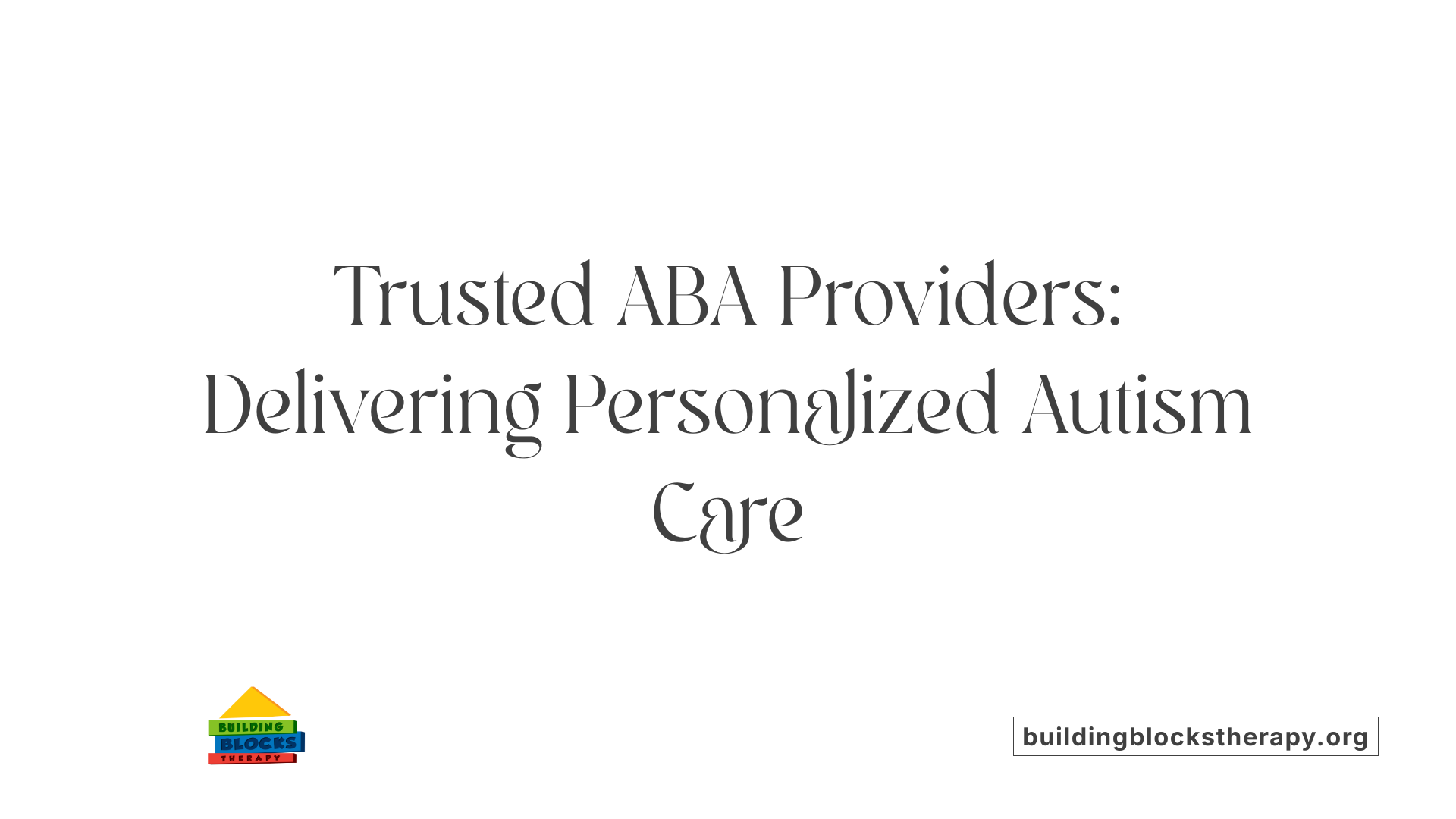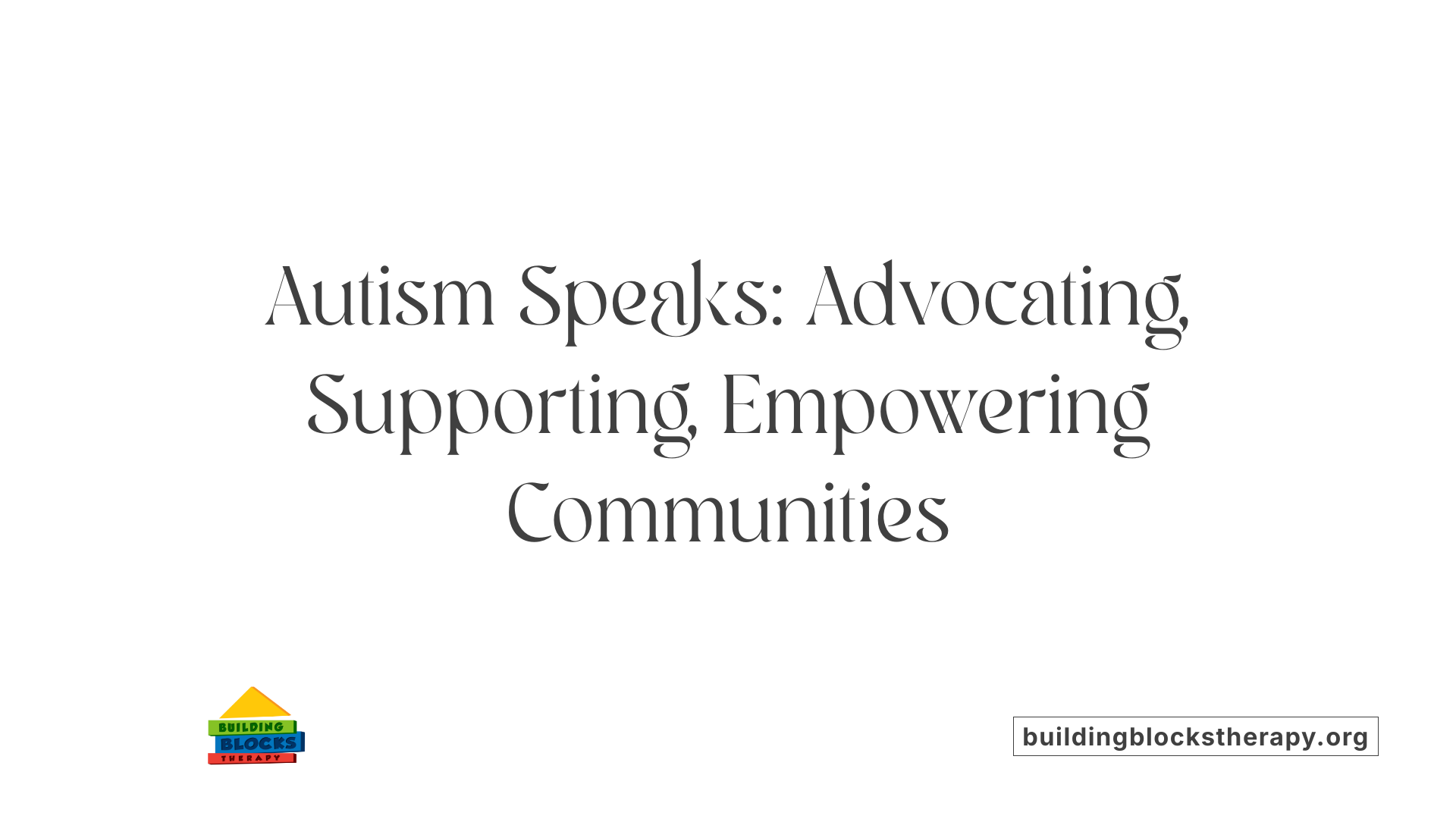Understanding the Landscape of Autism Support
Supporting individuals with autism involves a range of organizations dedicated to advocacy, research, therapy, and community engagement. Among these, some stand out for their comprehensive services and significant impact on improving quality of life for those on the autism spectrum. This article explores key autism organizations, their roles, and how they contribute to advancing therapies like Applied Behavior Analysis (ABA), research, and inclusive community programs.
What is Applied Behavior Analysis (ABA) Therapy?

What is Applied Behavior Analysis (ABA) therapy?
Applied Behavior Analysis (ABA) therapy is a scientifically-supported intervention that focuses on understanding and improving specific behaviors, often used for individuals with autism. It aims to develop helpful behaviors, such as communication and social skills, while reducing harmful or challenging behaviors.
ABA therapy is personalized and developed by certified professionals called Board Certified Behavior Analysts (BCBAs). It employs techniques such as positive reinforcement, discrete trial training (DTT), and naturalistic approaches like Pivotal Response Treatment (PRT).
Methods and settings of ABA therapy
ABA services are delivered in various models tailored to individual needs. These include:
- Center-based sessions
- In-home therapy
- School consultation
- Group or individual therapy
- Telehealth options that use digital tools for data collection and parental involvement
This flexibility allows therapy to be accessible and adapted to different environments where the individual learns and interacts.
Evidence supporting ABA effectiveness
Research shows that over 80% of children with autism experience significant improvements with early ABA intervention. Long-term studies confirm ABA's ability to enhance communication, social skills, and daily living abilities.
Organizations like Autism Learning Partners emphasize early intervention, particularly for children from birth to five years, as it leads to better developmental outcomes.
Family involvement in ABA therapy
Family participation is vital to ABA's success. Therapy often includes training and support for parents to implement strategies at home and to reinforce skills learned during sessions. This collaboration empowers families and ensures consistent progress.
Overall, ABA is a comprehensive, evidence-based approach that integrates professional expertise, individualized care, and family engagement to support people with autism in reaching their full potential.
Techniques and Benefits of ABA Therapy for Autism

How does ABA therapy help individuals with autism?
ABA therapy supports individuals with autism by focusing on teaching social, communication, and daily living skills through carefully structured and personalized interventions. Rooted in the science of learning and behavior, it uses positive reinforcement to encourage desired behaviors and reduce challenging ones. This therapy evaluates what triggers behaviors and their consequences, allowing for targeted changes.
Early and intensive ABA therapy has demonstrated significant, lasting improvements in language, social skills, emotional regulation, and academic abilities. It is highly adaptable and can be delivered in homes, schools, or community settings. Collaboration with trained professionals and involvement from parents ensures reinforcement of skills, promoting sustained progress.
What are the main techniques used in ABA therapy?
ABA employs several proven techniques including:
- Positive Reinforcement: Rewarding desired behavior to increase its frequency.
- Prompting and Fading: Guiding behaviors initially and gradually reducing help to encourage independence.
- Discrete Trial Training: Breaking skills into small, manageable tasks practiced repetitively.
- Behavior Chaining: Teaching complex skills step-by-step.
- Modeling: Demonstrating desired behaviors for imitation.
- Redirection and Extinction: Discouraging undesired behaviors by redirecting attention or withholding reinforcement.
- Visual Supports: Using charts, videos, or schedules to facilitate understanding.
These methods are customized to each individual's needs to target communication, social interaction, and adaptive skills.
Role of early intervention and individualized plans
Early intervention is crucial, as studies show that more than 80% of children with autism benefit significantly from ABA started in early childhood. Individualized plans are developed through systematic assessments to set clear goals and monitor progress continuously, ensuring therapy remains relevant and effective over time.
Settings where ABA is applied and its flexibility
ABA is delivered through various models, such as center-based clinics, in-home sessions, school consultations, group or individual therapy, and telehealth platforms. This flexibility allows therapy to be tailored according to the individual's needs, family involvement, and community context, maximizing accessibility and efficacy.
Leading ABA Therapy Providers and Their Role

Who Provides ABA Therapy Services?
ABA therapy is delivered by a range of licensed professionals trained in behavioral analysis. The main providers include Board Certified Behavior Analysts (BCBAs), who usually hold a master's degree, create and oversee individualized treatment plans, and supervise other team members. Registered Behavior Technicians (RBTs) work under supervision to carry out interventions. Some psychologists and counselors with relevant training may also offer ABA services even without specific ABA credentials. Becoming a qualified ABA provider requires certification, passing the BCBA exam, and renewing credentials biennially.
Major ABA Service Providers
Several well-known providers offer ABA therapy services across various settings. Autism Learning Partners (ALP), with experience since 1988, emphasizes early intervention and supports a range of delivery models, including center-based, home-based, and school-based therapy. Other notable providers include Silveira Behavior Consultants, Butterfly Effects, Hopebridge, Gateway Pediatric Therapy, Trumpet Behavioral Health, BlueSprig, Golden Steps ABA, Bierman ABA, InBloom Autism Services, Autism Learning Partners, Cross River Therapy, and ABC Behavior. These organizations tailor services to individual needs and often integrate multicultural and bilingual approaches to best serve their communities.
Insurance Coverage and Financial Accessibility
Most top ABA providers accept multiple insurance plans, including Medicaid and private insurance, making therapy more accessible to families. They also offer financial assistance programs to reduce economic barriers. This helps ensure that children and adults with autism can receive consistent, high-quality intervention regardless of financial background.
Trends in Technology and Family Involvement
Advancements such as telehealth services, digital data collection tools, parental portals, and artificial intelligence are transforming how ABA therapy is delivered, fostering greater access, transparency, and personalization. Family empowerment is strongly encouraged, with providers like ALP involving parents actively in therapy and offering training to support progress. Integrated multidisciplinary care involving coordination between therapists, families, and medical professionals is increasingly seen as a hallmark of effective ABA services in 2025.
Autism Speaks: Advocacy, Resources, and Community Engagement

How does Autism Speaks influence policy at government levels?
Autism Speaks actively works with Congress, the White House, and state legislators to shape policies benefiting individuals with autism. Their advocacy efforts have contributed to the signing of important legislation, such as California's AB 951 and AB 341, which improve access to behavioral health services.
What support does Autism Speaks provide for newly diagnosed individuals?
For those recently diagnosed with autism, Autism Speaks offers personalized assistance through their Autism Response Team. This resource guides families and individuals by connecting them with tailored information and support suited to their unique needs.
What resource guides and autism-friendly events are offered?
Autism Speaks publishes a comprehensive Resource Guide to help families locate autism specialists within their communities. They also organize sensory-friendly activities and events, including the annual Santa Cares holiday tradition designed to accommodate sensory sensitivities.
How does Autism Speaks advocate for legislative improvements and employment?
Beyond health services advocacy, Autism Speaks supports employment initiatives like the Workplace Inclusion Now (WIN) program, promoting job opportunities for people with autism. Their legislative advocacy focuses on expanding access to essential services and rights.
What community fundraising and awareness efforts does Autism Speaks lead?
Community involvement is encouraged through events such as the Empower Walk & 5K Run, which raise both awareness and funds for autism research and services. These gatherings also foster a sense of inclusion and understanding among participants and the broader public.
The Autism Research Institute: Advancing Knowledge and Best Practices

Research and educational resources
The Autism Research Institute (ARI) is a leading organization dedicated to advancing autism research and education. ARI provides a wealth of resources to support families, professionals, and the broader community in understanding autism and improving care.
Diagnostic and assessment tools
ARI offers various autism assessment tools, including diagnostic checklists and evaluation checklists, to aid in early detection and accurate diagnosis. These tools are designed to help guide comprehensive evaluations that are crucial in planning effective interventions.
Promoting best practices in autism intervention
Beyond assessment, the Institute plays an important role in advocating for best practices in autism intervention. This includes a strong emphasis on early intervention and behavioral analysis therapies, which are supported by scientific evidence. Through educational efforts, ARI helps promote effective strategies that align with improving developmental outcomes.
Latest research topics including exercise and probiotics
The most recent ARI research articles explore promising therapeutic approaches such as the benefits of physical exercise, the role of probiotics, and enhanced communication supports. These studies highlight a growing scientific foundation that informs treatment options tailored to individual needs.
Webinars and support for professionals and families
To facilitate knowledge dissemination, ARI hosts expert webinars connecting research findings with clinical care and community support. These sessions provide valuable opportunities for both professionals and families to stay informed about innovations and practical guidance in autism care.
The Role of Autism Learning Partners in Delivering ABA Services
Long-standing expertise in ABA therapy
Autism Learning Partners (ALP) has been a trusted provider of Applied Behavior Analysis (ABA) therapy since 1988. Their decades of experience underscore a deep understanding of autism intervention and committed service to the community.
Focus on early intervention and family involvement
ALP emphasizes early intervention, particularly for children from birth to five years old, recognizing that early support can lead to improved developmental outcomes. They actively engage families in therapy sessions, providing training and resources to empower parents and promote consistent progress.
Range of service settings including home and school
To accommodate diverse needs, ALP offers a variety of service settings such as center-based programs, home-based therapy, and school-based services. This flexibility ensures that children receive tailored support in environments where they feel most comfortable.
Use of evidence-based and family-oriented approaches
The therapy provided by ALP is grounded in evidence-based practices. Their approach blends scientifically supported methods with naturalistic and family-centered strategies, reinforcing skills in real-life contexts for better generalization.
Accessibility through insurance and diagnostic services
ALP facilitates access to ABA services by accepting various insurance plans. They also provide diagnostic assessments in select locations, aiding in confirming autism diagnoses and shaping personalized treatment plans. This comprehensive approach supports families from evaluation through intervention.
Choosing the Right Autism Organizations to Support
Supporting autism organizations that deliver comprehensive services, from advocacy to therapy, research, and community inclusion, ensures meaningful progress for individuals with autism. Organizations like Autism Speaks, the Autism Research Institute, and Autism Learning Partners play pivotal roles in advancing early intervention, promoting evidence-based therapies such as ABA, and fostering environments where individuals with autism can thrive. By understanding their contributions, families and supporters can make informed decisions about where to direct their resources for maximum impact.
References
- Autism Speaks: Autism support, resources & advocacy
- Autism Research Institute
- 12 Best ABA Therapy Services To Try In 2025
- Autism Learning Partners | Making Progress Possible
- Frequently Asked Questions | Washington State Department of ...
- Applied Behavior Analysis (ABA)
- Who can provide ABA therapy?
- Applied Behavior Analysis (ABA)






